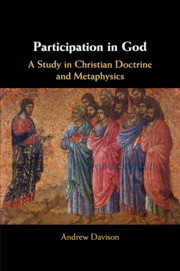4 results
Preliminaries
-
- Book:
- Three Faces of Sun Tzu
- Published online:
- 07 March 2024
- Print publication:
- 15 February 2024, pp 47-53
-
- Chapter
- Export citation
Preliminaries
-
- Book:
- Three Faces of Sun Tzu
- Published online:
- 07 March 2024
- Print publication:
- 15 February 2024, pp 47-53
-
- Chapter
- Export citation
Analogical reasoning in schizophrenic delusions
-
- Journal:
- European Psychiatry / Volume 19 / Issue 6 / September 2004
- Published online by Cambridge University Press:
- 16 April 2020, pp. 344-348
-
- Article
- Export citation

Participation in God
- A Study in Christian Doctrine and Metaphysics
-
- Published online:
- 15 August 2019
- Print publication:
- 01 August 2019



